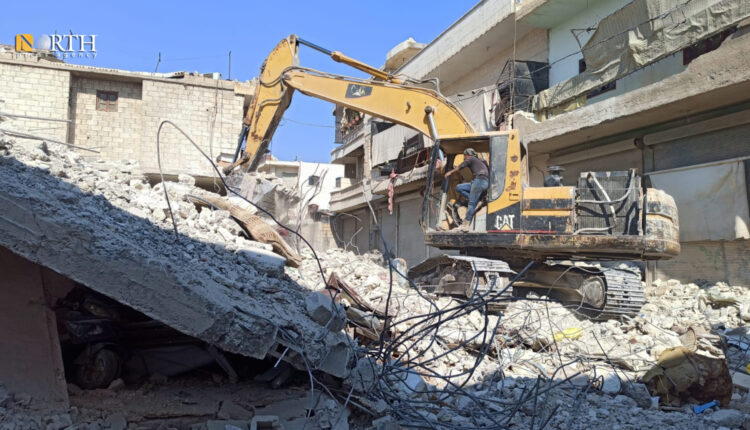
AFRIN, Syria (North Press) – The buildings destroyed by the earthquake opened new doors for some of Afrin’s poor. Two months after the earthquake, the people of al-Sinaa street in the town of Jindires in Afrin, northwestern Syria, are now removing the rubble of their destroyed homes to extract the iron bars from their former ceilings.
These operations now serve as a source of living for dozens of men who were left unemployed. Zuher Khalil, a man in his forties, is working on extracting the iron bars from collapsed buildings with his sons after being given permission from owners and relatives.
The February 6 earthquake that hit southern Turkey and northwestern Syria caused large-scale destruction in the town of Jindires. It is by some accounts the most devastated, having left 900 residents dead, as well as injuring thousands destroying dozens of buildings.
Locals began to work on removing the rubble and opening the roads with the help of the Syrian Civil Defense, a group affiliated with the opposition. Many young men came to Jindires to help, as well as to extract iron bars in return for relatively high fees compared to manual tasks.
Zuher Khalil, 42, from Jindires in Afrin countryside, said that many people from Jindires are suffering due to the scarcity of job opportunities after years of worsening conditions.
The Kurdish-majority region of Afrin has been under the occupation of Turkey and Turkish-backed armed opposition factions, also known as Syrian National Army (SNA), since 2018 following a military operation dubbed “Olive Branch” against the Kurdish People’s Protection Units (YPG) under the pretext of preserving Turkey’s national security.

However, the earthquake has created jobs for many young men. “For about one and a half months, I have been working with my 15 year-old twin sons in breaking the ceilings of destroyed houses and extracting iron bars as they are expensive. I manage to make between 100-150 Turkish liras [$5,20-7,80] per day,” Khalil said.
Khalil noted that these fees are “excellent” compared to the wage he received at his previous jobs, which never went above 50 Turkish liras ($2,60), which he says is partly and hardly enough to buy bread for a family of six.
“Though this work very strenuous, the income I bring home eases my fatigue. The living conditions are difficult and very expensive now. I do not have land to live off of or another job that can provide a good income. The conditions are worsening in all aspects.”
Rami al-Halabi, 35, a foreman from Jindires, established a workshop employing ten people. The group have special equipment, a vehicle to transport the rubble and another one to lift the rubble. Rami’s job is different from his previous jobs. He buys the rubble of destroyed buildings to extract iron bars and sells them. He makes high profits, and he sees it as better than his previous job in construction.
Al-Halabi noted that the local authorities are supposed to remove the destroyed buildings, but they do not.
This leads many people to remove the rubble on their personal expense in order to rebuild their houses or at least clear the destruction that pains and reminds them of the worst catastrophe in the history of the town.
Al-Halabi explained that the profits he makes are not much, considering he works with a ten-member crew with equipment and vehicles that regularly need diesel and maintenance. He sells one ton of the extracted iron for 400-500 USD.
He noted that, in order to extract one ton of iron, they need to work for two to three days, whereas multi-floored apartment buildings need at least one week of work in order to extract iron bars and transport the rubble outside of town. He gives his workers daily fees ranging from 50-150 Turkish lira.
Abdurrahman Suleiman, 34, from the village of Aghjala, near Jindires, heads to Jindires every morning with several young men from his village for work. They work in reinforcing cracked buildings and restoring houses damaged by the earthquake. There are hundreds of house in Jindires that were damaged, but did not completely collapsed, which are in need for restoration, such as rebuilding walls, reinforcing foundations and more, says to Suleiman.
He noted that he had no work since the olive harvest season ended months ago. After the quake, he resumed working in his original trade, construction, in Jindires.
He noted that since the first day of the earthquake, he has not stopped working. He has taken part in helping the affected people and lifting the rubble during the first days. Later, he started working with relatives in the construction and restoration of buildings.
The daily wages of Abdurrahman, who supports his parents and his family of five, vary between 150-250 Turkish liras ($7,80-13), as he is experienced and is willing to endanger his life. He noted that, in Jindires, many buildings would collapse or walls fall over, while they worked. The job is not easy, and the worker puts his life in danger, he adds.
